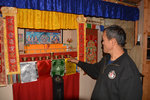
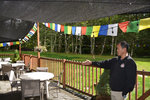
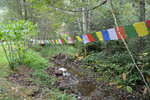
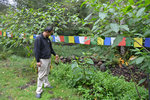
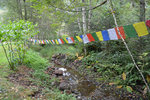
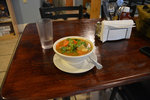
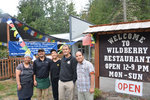
When the owner of the Wildberry Restaurant brings out a piping hot bowl of his signature stew, moving with ease through his cozy Ashford shop, it’s easy to think this soft-spoken man has spent his life here, filling the bellies of hungry tourists on the way to Mount Rainier.
But Lhakpa Gelu Sherpa’s life is a story of record-setting conquest on the world’s highest summits, of a man whose education stopped after the fourth grade, who’s never had a formal English lesson, who left the slopes of Mount Everest to deliver pizzas and package Coca-Cola in the United States, all to give his family the opportunities he never had.
If the 51-year-old doesn’t talk much about being the fastest climber to summit Everest, his eyes light up when he discusses his daughter Tashi’s studies at the University of Washington or the fresh ingredients his family puts into every dish they serve.
Growing up in Kharikhola, Nepal, at about 9,000 feet above sea level, Lhakpa had to walk three to four hours to get to a school. After the fourth grade, his family didn’t have enough money to continue his education. By the time he was a teenager, Lhakpa had started working as a porter on mountaineering expeditions, doing the work for which his people are known. Though “Sherpa” is often used as a shorthand term for the climbers who serve as mountain guides, the Sherpa people are actually one of Nepal’s 38 ethnic groups.
“Most Western people think Sherpa means porter,” Lhakpa said. “Sherpa is the ethnic group.”
The association has stuck because the Sherpas have proven particularly suited to mountain expeditions, perhaps because so many of them have spent their lives at high elevation. With a lack of other opportunities, many go to work on climbing teams. Lhakpa was no exception.
“Still the Sherpa people do the mountaineering,” he said. “The Sherpas live in the high altitude places, more than 9,000 feet. Other ethnic groups live in the cities and low places. … Without Sherpas, it’s not possible to mount expeditions.”
Lhakpa quickly found himself to be adept, and by the time he was 25, he had been selected for his first Everest expedition. Sherpas, he said, feel the same exhilaration as Westerners when they reach the summit, but the calculation is different. Visitors often pay tens of thousands of dollars for a once-in-a-lifetime experience. Sherpas climb over and over again, depending on it for their livelihood. Lhakpa has summited Everest 15 times, and his work history is a checklist of the world’s most iconic peaks.
“We are pretty happy to get to the summit every time,” he said. “People are paying lots of money to get up there. … People try to come to the summit of Everest, and we take them up. We are very excited and pretty happy, because it’s a successful job.”
Lhakpa made his mark on the climbing world in 2003, when he climbed from base camp to the summit of Everest in the 10 hours, 56 minutes, 46 seconds. The record still stands. He set off with a goal a 12 to 15 hours, but found himself reaching each waypoint ahead of schedule.
“I got more excited,” he said. “I feel stronger. I can do it.”
His accomplishment came with acclaim, but for all his success in the mountains, Lhakpa had set his sights on a new goal: the United States. For Sherpas, even with their world-class skills and stamina, even though they’re putting their lives at risk, mountain guiding is not a lucrative endeavor. Lhakpa lost a member of his team in an avalanche on a climb of K2. He was away from his family for long stretches of time. He wanted his children to go to school so they would have more options than him.
“My English is only from practice,” he said. “I didn’t go to any school. I didn’t have any special class. It was pretty difficult to find a job without an education. The mountain is one of the best jobs for me.”
That would be different for his family. In 2005, Lhakpa and his wife Fulama moved to New York, where they scraped together an existence, living in a small apartment while he worked for a moving company. By 2007, they were able to bring over their three children, Dawa, Ngima and Tashi. The Sherpas lived in Utah, where Lhakpa took a shuttle two hours to sell coffee at a ski resort, then worked a second job delivering pizza. Fulama worked at a bakery. Later, he took a job stocking for Coca-Cola, which proved to be a demanding job even for a man accustomed to hard physical labor.
“I feel very thankful for them,” Tashi said. “Because I know that they’ve done so much for me.”
In 2007, Lhakpa found a new job that suited him, guiding climbers up Mount Rainier for Alpine Ascents. He quickly found himself at home in the Pacific Northwest.
“In Ashford here, I feel like it’s Nepal,” he said. “Trees, rivers, creeks — we have the mountain right here. I feel like it’s Nepal here.”
He also found a small community among the handful of other Sherpas guiding on the mountain, and a growing Sherpa population in Seattle — where the family lives during the winter — that’s nearing 200. Though Rainier doesn’t match the height of the Himalayan peaks, Lhakpa said reaching the summit is no joke.
“People say, ‘Rainier’s nothing for you, right?’” he said. “The altitude is nothing, but technically, all mountains are the same. The avalanches and the crevasses, that danger, all mountains are similar. Sometimes the weather danger, I haven’t seen on Everest that kind of danger.”
Lhakpa has climbed Rainier 95 times, including a summit with his children Dawa and Tashi.
“I was so proud when I got up there,” Tashi said. “I looked super weak, but I knew I wasn’t.”
Though their father’s accomplishments are legendary, his kids don’t look at him as an imposing figure.
“He’s my dad, so it doesn’t feel too overwhelming,” Dawa said. “I see him every day.”
Added Tashi: “He doesn’t really talk about what goes on while he’s climbing. I’m not really aware of how amazing what he did is. He doesn’t tell us many stories about climbing.”
She said her father, who comes across as reserved, has a playful side at home.
“My Dad can be very childish around me,” Tashi said. “It’s kind of funny, because we turn super serious around other adults. With me he’s super childish, and I like that.”
Lhakpa also speaks highly of Fulama, to whom he’s been married for 31 years. She’s the co-owner and chef at Wildberry, and he said her food expertise — after years of working at Whole Foods in Seattle — has been crucial to their venture. The Sherpas also ran a restaurant in their village in Nepal before moving to the U.S.
The couple bought the Ashford restaurant from another Sherpa couple in 2016, and it’s allowed the whole family to work together as they’ve made it their own. Lhakpa has done all of the woodwork and painting, calling himself an “engineer without an education.”
“They don’t like me guiding that much,” Lhakpa said. “I could do it until I’m 60, but we decided to buy the restaurant, and then we’ll work together.”
Entering Wildberry, customers walk past a wall of handmade hats from Nepal. There are panoramas of Himalayan peaks, photos of Lhakpa’s expeditions and a Buddhist shrine. Prayer flags line the outdoor seating area. The menu is a mix of traditional Himalayan food and American staples.
“Ninety-nine percent of people like it,” Lhakpa said. “I have two different foods. I have burgers and sandwiches, and Nepalese food. If five or six people come to dinner, most of the people want to get Nepalese food.”
The restaurant sits just before the Nisqually entrance to the national park on State Route 706. It’s open from May to October, and the summer months find it packed with Rainier visitors who want a taste of the mountain cuisine — or just a cold beer.
Wildberry’s offerings include a hearty Sherpa stew, chicken and mushroom thali dishes and pork momo dumplings. Fresh blackberry and huckleberry pies add a local flair. Members of the Sherpa family move to and fro, seating customers, taking orders and bringing out food. Fulama said the atmosphere at the restaurant is better than working in a corporate environment.
“It’s more comfortable to work with your family members,” she said.
Lhakpa has stopped guiding on the mountain, although he still helps lead an annual expedition up Rainier, a fundraiser to help build a cultural center for the Northwest Sherpa Association. He still has close ties in Nepal, and he’s hoping to bring his family back for a visit this winter. He also runs the Lhakpa Gelu Foundation, which has helped fund projects back in his home country, including replacing roofs in his hometown that collapsed during the 2015 earthquake that devastated the country.
The family recently purchased three acres of land around the restaurant, and they’re hoping to one day build a museum of Sherpa culture on the property. After a lifetime of climbing mountains, scraping out a living at various jobs across America, Lhakpa is happy to have settled into Washington, working alongside his family, sharing his home country’s culture with countless visitors to Mount Rainier.